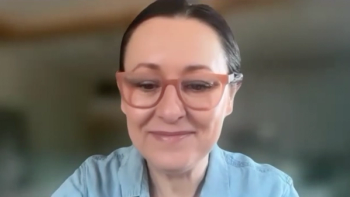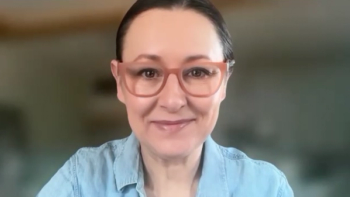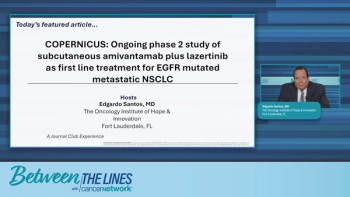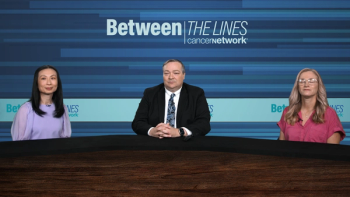
According to Jean L. Wright, MD, FASTRO, the flow of new information and research pertaining to ductal carcinoma in situ is constant.

Your AI-Trained Oncology Knowledge Connection!


According to Jean L. Wright, MD, FASTRO, the flow of new information and research pertaining to ductal carcinoma in situ is constant.

The implementation of AI into radiomics may help predict the likelihood of response to therapies among patients undergoing breast cancer treatment.

Long-term follow-up data on BTK inhibitors reassures patients about safety and efficacy, guiding treatment decisions for chronic conditions.

Panelists discuss how early referral drop-off is driven by awareness gaps, outdated perceptions of when CAR T should be used, travel/caregiver burdens, and process complexity—and which barriers are most addressable.

Kathie-Ann Joseph, MD, MPH, FACS, described the clinical criteria for nipple-sparing mastectomies and oncoplastic surgery, focusing on tumor-to-nipple distance and oncologic safety for breast cancer patients.

Experts discuss the promising long-term results of zanubrutinib for high-risk CLL patients, emphasizing the importance of upfront biomarker testing.

Panelists discuss how real-world CAR T outcomes in older or comorbid patients can mirror trial results when organ function, monitoring, and multidisciplinary support are optimized.

Theranostics is an escalating field within radiation oncology and clinicians should be utilizing it every day, according to Brandon Mancini, MD, MBA, FACRO.

Over the past 10 years, more barriers have become apparent in the process of getting insurance companies to approve cancer treatments, according to Loretta Nastoupil, MD.

Ifeoma Dikeocha, PhD candidate, explains why triple-negative breast cancer is uniquely sensitive to fasting mimicking diets.

Although institutional cancer centers boast large amounts of resources, community centers do not always have the resources to initiate clinical trials, according to Loretta Nastoupil, MD.

The consolidation of oncologists and the transition to bispecific antibodies and CAR T-cell therapies are among factors that have led to increasing cancer care costs.

Additional translational research may help inform the design of next-generation therapies for patients with multiple myeloma, said Manoj Bhasin, PhD, MS.

Experts discuss the importance of germline testing in younger gastric cancer patients and the evolving multidisciplinary approach to treatment.

Artificial intelligence may be used in CT scans to help detect early-stage disease in at-risk patients undergoing screening for cancer.

Kathie-Ann Joseph, MD, MPH, FACS, explored evolving surgical strategies for inflammatory breast cancer and phyllodes tumors.

Soumen Das, MBBS, MS, FACS, details how the BC-RADS-2 study standardizes clinical breast examinations to combat diagnostic delays and improve early-stage detection in low-resource oncology settings.

Soumen Das, MS, FACS, discusses the BCRADS-2 study, a validated clinical scoring system designed to standardize breast cancer triage and downstage palpable lesions in low- and middle-income countries.

Soumen Das, MBBS, MS, FACS, discussed the BC-RADS-2 study, a community-integrated approach to standardizing breast cancer detection in low-resource settings through a structured clinical reporting and data system.

Panelists discuss how sequencing choices before third-line CAR T balance disease control and eligibility preservation, while avoiding prolonged therapies that could compromise later collection or outcomes.

Experts discuss treatment options for a 70-year-old woman with low-risk MDS, emphasizing the need for more clinical trial data and real-world evidence.

Panelists discuss how prior BCMA-directed or bispecific therapy may affect T-cell fitness and CAR T planning, including the value of early referral and strategic washout/bridging approaches when feasible.

Ian Flinn, MD, PhD; and Danielle Brander, MD, reflect on the key long-term findings from the SEQUOIA trial, with particular emphasis on durability of response and outcomes in high-risk patient populations.

In this segment, experts review 6-year follow-up data from the SEQUOIA and ALPINE studies in CLL and SLL, with a focus on efficacy, safety, and treatment selection in the modern era.

This study explores the efficacy and safety of amivantamab plus lazertinib for patients with EGFR mutations and brain metastasis.

Multidisciplinary teams reassess advanced cancer patients post-chemotherapy to optimize surgical outcomes and manage treatment-related challenges effectively.

In this concluding segment, the panel reflects on the evolving landscape of treatment for myeloid malignancies, including high-risk MDS and CML, with a focus on oral HMAs. Dr. Fazal emphasizes the importance of clinical trial participation, noting that although some combination therapies may not show overall superiority, subsets of patients demonstrate meaningful benefit, highlighting the need for ongoing research and novel therapeutic strategies.

Panelists discuss how the expanding volume of clinical data—both positive and negative—is increasing treatment complexity while reinforcing the need for individualized, patient-centered decision-making.

Discover the latest FDA-approved therapy for high-risk smoldering myeloma, enhancing early intervention strategies and patient care discussions.

The final segment synthesizes the discussion and looks ahead to the future of BCMA bispecifics. Jagannath recaps the extraordinary strides made thus far, from strong response rates to improved safety management, and highlights the growing role of combinations with agents like daratumumab and the expansion into newly diagnosed and smoldering myeloma clinical trials.